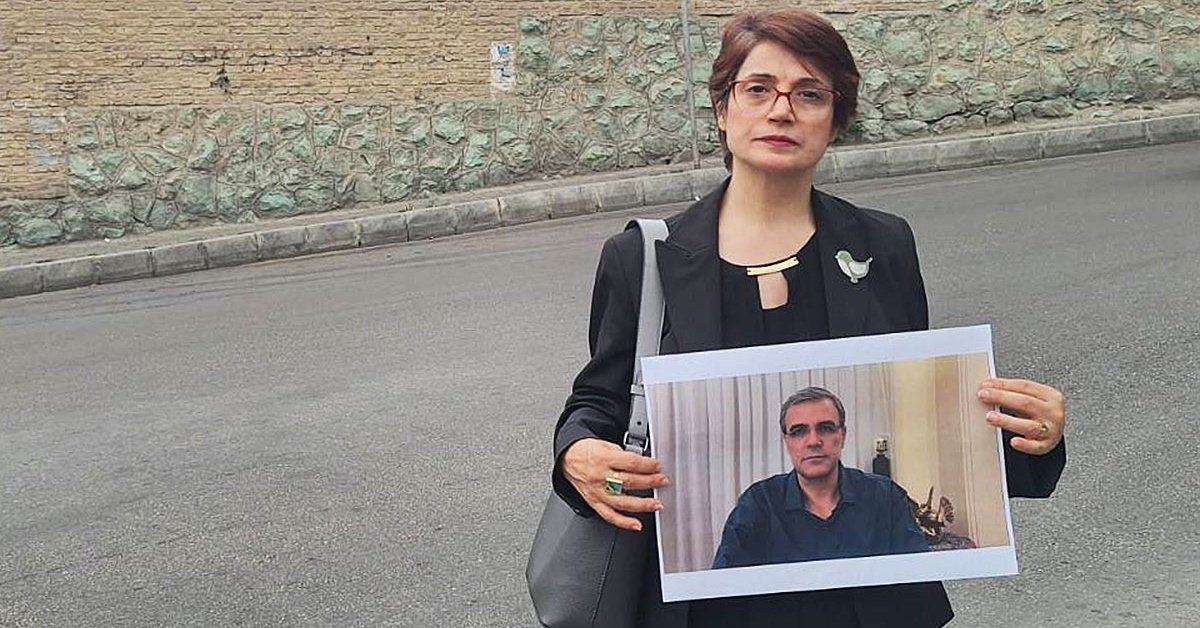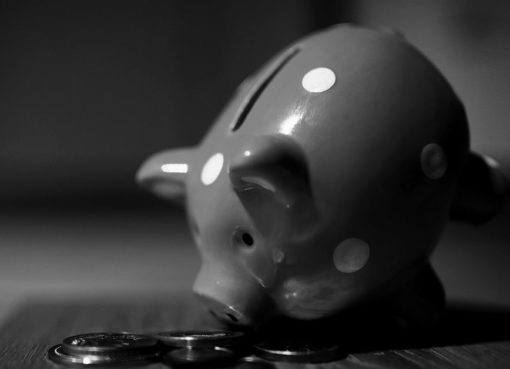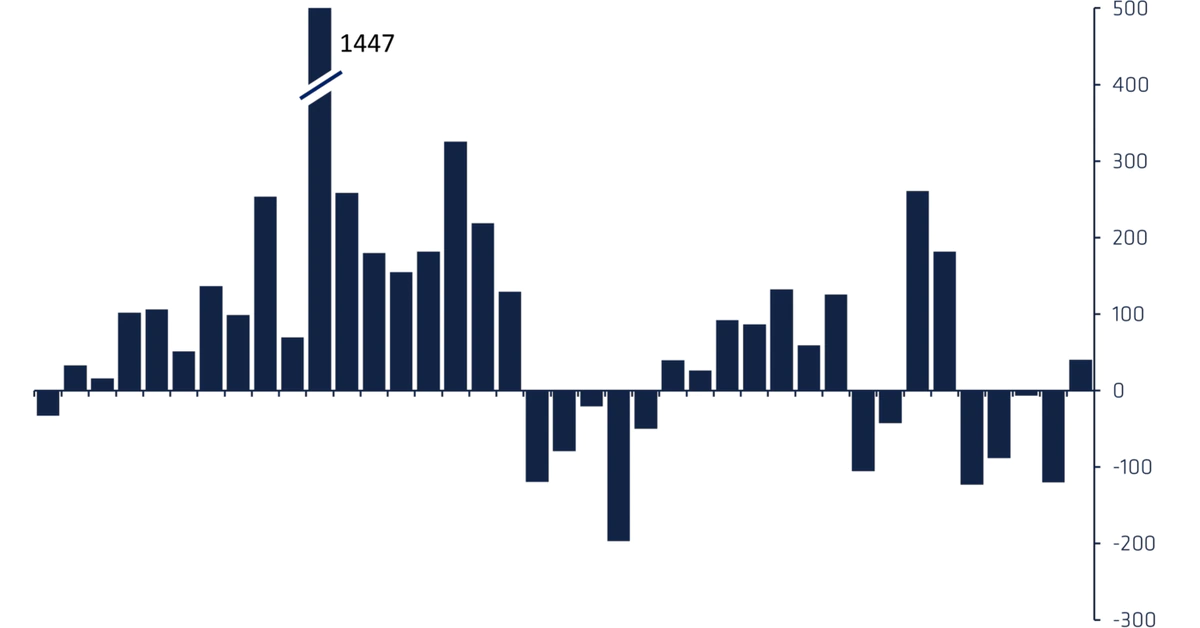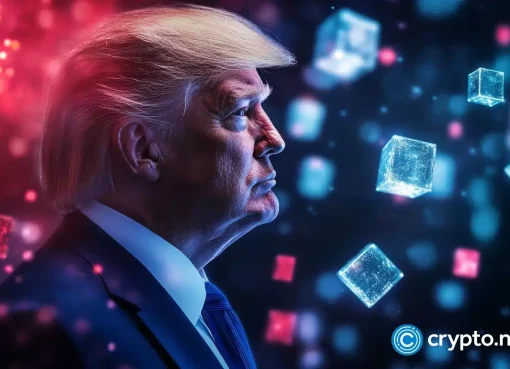Reza Khandan was arrested in December 2024 for supporting women’s rights in Iran, and creating thousands of homemade buttons that said, “I Oppose the Mandatory Hijab.” He had previously been imprisoned for 111 days in 2018 for this so-called crime before being released on bail.
Reza’s wife, Nasrin Sotoudeh, spent over six years in Iranian prisons for her work as a human rights attorney and activist. Reza raised their daughter and son while maintaining his graphic design business, and defying government threats as he campaigned for Nasrin’s freedom. Now, Nasrin is home on a medical furlough for a heart condition that was exacerbated by COVID-19 and mistreatment in prison, and Reza is facing at least three more years in Tehran’s notorious Evin Prison.
I got to know these good people when I directed and produced Nasrin, a 2020 documentary about her life and work. She was in prison most of the time we were filming, and I saw Reza’s character— and love—repeatedly tested by a regime that punishes families as a way of inflicting additional pain on its detainees.
This interview started in April when I sent a series of questions to Reza. Slowly and with some complicated back and forth, he passed his answers to me.
Why have you put yourself at risk (in and out of prison) by criticizing your government—and is it dangerous for you to do this interview? I have a duty and the privilege to defend my rights and the rights of others. Without that, there is a dark future for us and our children. In a country like Iran, with this government, every protest and criticism carries a risk, but that’s a chance I’m willing to take.
You are a man, with all the privileges that brings in virtually every country. Why do you so strongly support women’s rights? No country can achieve democracy, and development with justice and human dignity, without guaranteeing equal rights for women and men. A society that ignores the rights of half of its population will never achieve real greatness.
Describe your December 2024 arrest. That morning, I’d gone to the store so I could do some work at the house. On my way back, I noticed several people standing by the entrance talking to the building manager. As soon as I got out of the car, they came towards me, pointed at my license plate, and said they were investigating a crime that had been committed with my car.
It quickly became clear that all of their words were lies, and their real intent was to arrest me for my judicial case. After a minute or so, Nasrin joined us. She asked if she could get our son Nima from upstairs so he and I could have a moment together before they took me away. They said yes, but when she left to get him, they forced me into their car and drove off. I never got a chance to say goodbye to my son.
I slept in the detention center that night. It was extremely cold. They intentionally turned off the radiator, and there was no other heating device. The detainees were not given food or water. The cells had no beds and there were only a few dirty blankets to somehow be shared by about a dozen people. The Guardian Officer responded to my protests with dirt and ridicule. The filthy bathroom had no soap. They weren’t even willing to even let me buy soap with my own money.
The next morning, I was transferred to the prosecutor in Evin Prison’s court. After hours of being interviewed and processed, I was transferred to a prison quarantine, where I stayed for nine days without any outside contact.
Read more: Why Iran’s Leading Women’s Rights Defender Thinks the Protesters Could Topple the Regime
What is your typical day like in prison? Part of my day is spent cleaning and doing personal chores like buying supplies that are available in the prison store. Food in Iranian prisons is rarely edible, so we have to purchase whatever ingredients we can and prepare our own meals. Ward 8, where I am held, has 33 gas burners for around 600 people. I am part of a group of about ten inmates who cook and eat together, and we are allowed to use a burner three times a week.
When possible, I read in the library, and I make sure to exercise. I also walk with friends, which gives us the opportunity to exchange opinions about the news we get through contact with our families. The big problem for an inmate is usually the very slow passage of time, but for me it is just the opposite. I don’t want my time here to pass faster because that means I am losing all the moments I should be sharing with my wife, my children, and others I love.
Describe Evin Prison and the ward you are in. Evin Prison houses about 15,000 inmates divided into different wards, and there is extreme overcrowding. The reason Evin is infamous is because of its terribly cruel high security detention centers that are poorly supervised by the Prison Chief. Each of these security areas is controlled by of one of the government’s security bodies, such as the Ministry of Information, the Revolutionary Guards, and the Judiciary.
These detention centers do not comply with any law. Their interrogators employ all kinds of inhumane behavior with the inmates, who are systematically deprived of their rights. Prisoners face beatings, denial of medical care, months in solitary confinement with a total news-blackout, crushing interrogations, forced confessions that taped and broadcast on national television after heavy editing, plus psychological, physical, and sexual torture.
Even seemingly small acts deliver needless cruelty. For instance, prisoners have to wear a blindfold and be escorted by an officer if they need to use the bathroom or go to the nurse’s office.
After the interrogation phase and the issuance of a sentence, prisoners are transferred to a public ward. This is where we will remain until our sentence expires. I am in Ward 8, which has about 600 prisoners. Almost 80% of these men are held for public offences, and the rest are political. Political prisoners do not enjoy equality with ordinary prisoners. We are constantly monitored and followed, our phone access is strictly controlled, the limited calls we do get are constantly cut off for false reasons during conversations, and we rarely get parole.
Bedbugs continue to plague all the prisoners. Drugs are rampant. The prison yard has become unusable due to drug use in front of guards and cameras.
The slightest complaint about the prison administrators’ performance is severely suppressed. This is why I have gone on several hunger strikes since my arrest.
How and why have the authorities harassed and hurt your family? How does this make you feel? The Iranian government actively suppresses the voices of civil society, especially women, and it reacts with great brutality to the smallest protest or disobedience. My wife Nasrin was imprisoned for over six years for her work as a human rights attorney. Our daughter Mehraveh has been threatened and harassed in numerous ways (including a forced daylong interrogation). Our son Nima was savagely beaten by prison guards when he tried to visit me (this was no accident, but a planned assault). In addition, our bank accounts were frozen, and now I am held in one of the worst wards of Evin Prison because I support women’ rights and I made buttons that said, “I oppose the mandatory hijab.”
Many others have faced similar cruelties, and much worse.
Despite all the difficulties and hardship that Nasrin has endured on this path, she doesn’t doubt her choices. Neither do I. We can’t be apathetic towards injustice and oppression. I think this is why regardless of the challenges and struggles we’ve faced; we have kept the family close and as strong as ever. This is the treasure that has made all our activism possible.
What has your wife Nasrin taught you and how does she inspire you? I’ve loved Nasrin since we first met, and a shared commitment to women’s rights and opposition to the compulsory hijab has always been part of our relationship.
Nasrin was unjustly and cruelly imprisoned for her legal work representing Iranian human rights and women’s rights activists from 2010 through 2013 (when our children were very young), and again from 2018 through 2021 (she was eventually released on a medical furlough due to a serious heart problem). In October 2023, she was beaten, arrested, and detained for several weeks for attending the funeral of Armita Geravand, a 17-year-old who was killed for supposedly not properly wearing her hijab.
All this time, Nasrin has never stopped showing a deep concern for her family, and she has never given in to enormous pressure from the government. I am inspired by those qualities, and more. I am also inspired by my fellow inmates who have been arrested for their support of human rights, in Iran and around the world.
Read more: Nasrin Sotoudeh Is on the 2021 TIME100 List
You have spoken openly about some of your cellmates who are also imprisoned for being human right activists. If it will help and not put them at risk, please share what you can about them. We have no statistics of the number of political prisoners in the security detention centers inside Evin Prison, but I estimate that there are about 300, and about 70 of them are women. There are nearly 80 political prisoners in our ward alone, including men with dual citizenship, women’s rights and democracy activists, and those held for a variety of ideological beliefs.
Reza Valizadeh is currently the only dual-national political prisoner with American citizenship. Last year he visited Iran to see his aging parents. After a few months of harassment and interrogation, he was finally arrested and sentenced to ten years in prison. Valizadeh was a radio reporter until a few years ago, so they tried to force him to confess to “collaborating with a foreign government.” The also tried to get him to speak against his former colleagues at Radio Farda, which he strongly rejected. Valizadeh has consistently stood up against their inhumane demands.
Mohammad Najafi, Mohammad Reza Faghihee and Taher Naghavi are lawyers who are in prison for their human rights activities. Mohammad Najafi holds the record in having the most cases created against him. He has been in prison for nearly 7 years.
Vahid Khadirzadeh is a young man who was convicted and incarcerated for protesting the forced veiling of women, and he is somewhat similar to me and my friend Farhad Meysami (Farhad was imprisoned for 5 years).
Another man is in prison for the fourth time for a total of 8 and a half years. He says he spent 120 days in solitary confinement during one of his detentions. Because of this experience, he was so intellectually and psychologically disturbed that at the end of confinement when they gave him a piece of fruit, he could not remember the word “orange.”
What personal message can you say to your daughter Mehraveh and your son Nima? Nasrin and I at all times think about our son and daughter. When we are working for individual freedoms and human rights, and when we are away in prison for those activities, Mehraveh and Nima are in our hearts. We consider their circumstances, their dreams, their future, and the future of all the children in this country. They deserve a better life.
All our strength and energy come from our children, who have suffered more than us. Nasrin and I are very proud of them, and we have learned from them greatly. Being separated from Mehraveh and Nima, and from Nasrin, is agony. I love them very much.
You are in prison in part because you believe in a democratic ideal, yet democracy is being seriously challenged in many countries, including America. Do you still believe in democracy and where do you see the world headed in the next decade or two? The process of democratization starts and stops, but the world is moving forward. Progress is inevitable. Perhaps it is hard for people in other countries, like yours, to imagine having leaders who have so little concern for human rights that they will lock up individuals for trying to make their society better. This can happen if you are not careful.
In Iran, I feel the arrest of people like me, activists in the women’s movement, protesters of the compulsory hijab, and advocates of a just civil society, is a last desperate and senseless attempt to continue this incompetent and corrupt government.
I do draw hope and strength from those here who support the process of democratization, and from people half-way across the world whose daily lives are dedicated to the fight against injustice. I am proud of our work and am sure that we have taken the right path.
How can you keep hope alive in prison? The most important point of hope is that it strengthens our belief in change and in the impact our activities have outside of prison. When political prisoners hear of support from people like you, it has a direct benefit. Knowing we are not alone and not forgotten is very closely tied to keeping our sense of purpose.
Of course, all prisoners must have a plan for themselves. Reading, exercise, exchange of information and ideas with fellow inmates, and helping each other, all helps us to serve our sentence with the least damage.
What message do you have for the leaders of Iran? Leaders of authoritarian governments do not want to hear anything except praise. They always deem themselves to be an exception to the lessons of history. But they should know, history doesn’t have any exceptions.
I also want to say, “I demand freedom for all political prisoners,” and “I object to the compulsory hijab!”
What would you like to say to all the people who signed the petition calling for your freedom? When Nasrin told me that this petition was signed by so many people from dozens of countries around the world, it made me very proud and hopeful. I am deeply grateful to every one of these dear friends. Were it not for this level of concern, awareness, and public pressure for the release of me and other political prisoners, our condition would be much worse and more dangerous. This a great blessing.
Farsi translation by Parisa Saranj




